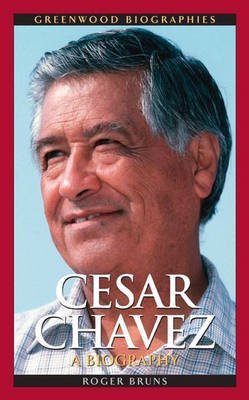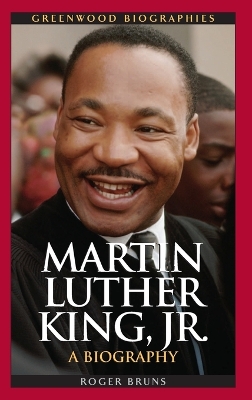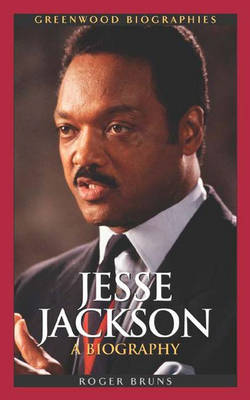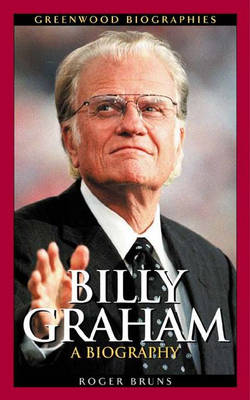Greenwood Biographies
4 total works
Cesar Chavez, the labor organizer and founder of the United Farm Workers of America, was, perhaps, an unlikely hero. In this biography, his early life is shown to be fairly typical for a boy in a close-knit family of Mexican Americans who worked the land in Arizona and California and endured hardship and discrimination. His story reveals the underside of the American Dream, and his later successes in helping farm workers and building a union to represent them are a testament to something extraordinary in a seemingly ordinary man.
As a young man, Chavez looked for a way out of the fields in the Navy but only found similar ethnic hatred. He married and started a family soon after his discharge and returned to the fields. Chavez hated the injustices meted out to his family and other migrant workers. They were on American labor's last rung, thousands of individuals making a pittance for their back-breaking work, living in desperate and inhumane conditions, poisoned by the pesticides, with few rights or leaders on whom to lean. The migrant workers found a champion in Chavez, who started to see the possibilities of making a difference for those in need. He began to work for a social service agency in California and met a priest who inspired him to read and learn about figures such as Mohandas Gandhi. From that point on, his labor activism is legendary. In the context of the times, with the Civil Rights Movement, Vietnam, and race riots raging, Chavez is shown to slowly build the farm workers labor movement, along with colleagues such as Dolores Huerta. Using the nonviolent examples of Gandhi and Martin Luther King, Jr., from the 1960s until his death in 1993, Chavez launched strikes, boycotts, marches, and his famous hunger strikes to force concessions from the big growers for better conditions and pay for the workers. His union lobbied Congress on behalf of the farm workers. Chavez and his supporters faced police and grower brutality, government surveillance, and death threats, and he was jailed several times. Like Gandhi, his example is for the ages.
There has been recent controversy in the African American community about youth and their lack of appreciation for the gains of the civil rights movement of the 1950s and 1960s. This stellar biography is a superb introduction to the foremost leader of the civil rights movement. The story and historical context will be eye-opening for students and a good refresher for others who are too young to have remembered the events. In a gripping narrative style, the biography traces the young Martin, the son and grandson of formidable preachers, to his calling as a minister too, but one who would take on the entrenched racism of the South, and North, through a nonviolent movement that changed the course of American history.
There has been recent controversy in the African American community about youth and their lack of appreciation for the gains of the civil rights movement of the 1950s and 1960s. This stellar biography is a superb introduction to the foremost leader of the civil rights movement. The story and historical context will be eye-opening for students and a good refresher for others who are too young to have remembered the events. In a gripping narrative style, the biography traces the young Martin, the son and grandson of formidable preachers, to his calling as a minister too, but one who would take on the entrenched racism of the South, and North, through a nonviolent movement that changed the course of American history.
King's story is compelling, starting from his early nurtured family life in an insular community of blacks in Atlanta. His education at Morehouse College, Crozer Theological Seminary, and Boston University and courtship of Coretta Scott lead into the early days of the civil rights movement and King's leadership role in the major marches, demonstrations, boycotts, and sit-ins that took place, mainly in the South. Critical insight into the Kennedy and Johnson Administrations is given as King negotiates with the presidents for equal rights for blacks. The violent reactions against and hatred of many whites for those seeking racial justice are still shocking today. Against the backdrop of beatings, killings, bombings, threats, and imprisoning, King is portrayed as driven to lift up all Americans, even if it meant martyrdom.
Jesse Jackson, a powerful orator and indefatigable organizer, has been one of the most dynamic forces for social and political action in both the national and international arenas, campaigning for human rights and social justice. Through such social action projects as Operation Breadbasket, Operation PUSH, and the Rainbow Coalition, as well as his own candidacy for the Democratic nomination for president in 1984 and 1988, Jackson became a worldwide spokesman for the minorities, marginalized, and poor. This biography traces his rise from his single-parent upbringing in Greenville, South Carolina, through his civil rights work with Martin Luther King Jr., to social and political leadership, audacious international diplomacy, and continued efforts to keep hope alive. It also covers his personal struggles and family life and includes commentary from those who have known him over the years.
Jesse Jackson, a powerful orator and indefatigable organizer, has been one of the most dynamic forces for social and political action in both the national and international arenas, campaigning for human rights and social justice. Through such social action projects as Operation Breadbasket, Operation PUSH, and the Rainbow Coalition, as well as his own candidacy for the Democratic nomination for president in 1984 and 1988, Jackson became a worldwide spokesman for the minorities, marginalized, and poor. This biography traces his rise from his single-parent upbringing in Greenville, South Carolina, through his civil rights work with Martin Luther King Jr., to social and political leadership, audacious international diplomacy, and continued efforts to keep hope alive. It also covers his personal struggles and family life and includes commentary from those who have known him over the years.
For decades, Reverend Jesse Jackson has been the nation's foremost African-American activist and leader. He has used his considerable talent, charisma, and ambition with great success, and the many accomplishments are discussed here. Readers will learn how Jackson has manipulated the system to fight for economic justice and political goals, breaking new ground. He and his actions have also engendered towering animosity, resentment, and scorn, and critical views of him are presented as well. Numerous photos complement the biography.
Billy Graham, the high-profile evangelist, author, and founder of the diverse Billy Graham Evangelical Association, is now in his 80s. Yet his popularity is undiminished, thanks to new generations seeking Christian spiritual fulfillment. Graham is the superstar evangelist who has remained untainted by the financial and sex scandals that have plagued his evangelical peers. His movie-star looks, manner, and propriety have made him a role model, and have brought him into close contact with power. He has had a personal relationship with every president since Dwight D. Eisenhower, serving as an unofficial White House chaplain and, to some extent, policy advisor. This balanced biography covers Graham's life and work, his extraordinary accomplishments, and the criticisms he has endured.
It is clear that Graham will be remembered as a tireless crusader for his faith in popular revivals around the world. He has preached in nearly 200 countries, drawing the largest crowds for religious events in history, and made special efforts to reach audiences in Communist countries in Asia and the Soviet Union, which alienated fundamentalists.



